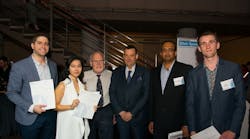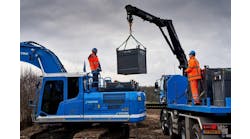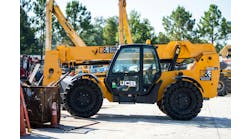Skyjack Partners with University Students to Innovate AWP Designs
Skyjack’s recent partnership with college students has resulted in potential concepts for future Skyjack scissorlift and boomlift designs, the company said.
Skyjack partnered with fourth-year industrial design students from the Bachelor in Industrial Design program offered by Humber College’s School of Applied Technology, based in Toronto. Skyjack challenged the students to work on the aesthetic styling of its DC scissorlifts, rough-terrain scissorlifts, articulated boomlifts and telescopic boomlifts.
“The students’ designs were an impressive mix of innovation and practicality,” said Malcolm Early, vice president of marketing, Skyjack. “They independently visited customers and jobsites, then used those inputs to come up with innovative ideas ranging from terrain detection to camera systems.”
“When we interacted with a lift on our own, we saw different areas where we could improve the machine’s ergonomics,” said Michelle Tran, a student who participated in the project. “One thing I learned through this project is that whatever we designed we had to take manufacturability and keeping costs low into consideration.”
The partnership was part of an industrial design practices course, where faculty members in charge Dennis Kappen and Glenn Moffatt, asked 27 students to research competitive brands, visit equipment rental companies, conduct ethnographic research and assimilate operators and rental companies’ feedback on the Skyjack products. Kappen and Moffatt also asked them to incorporate ergonomics and human factors design criteria into their designs.
The eight-week partnership began with a visit to Skyjack’s plant.
“My key takeaway from this project was the importance of user experience and the use of considerate ergonomics as a remedy,” said Elio Pedulla, another of the students.
The students’ concepts were entered into a Skyjack-sponsored competition, where a team of Skyjack senior executives, engineers and designers judged the ideas based on creativity, practicality and presentation. Three teams were awarded a total of $5,000. Students said the partnership expanded their understanding of the industrial design process.
“As a designer, I personally enjoyed how the Skyjack project challenged my design sensibilities,” Pedulla said. “Understanding Skyjack’s culture and the labor/construction force helped me to angle planning and design to offer a better product for the end user.”







